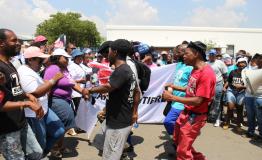

Mexico
In 2020, MSF organised a range of COVID-19 emergency responses in Mexico, which had one of the world’s highest number of deaths from the virus. In May, we began working in a hospital extension unit at Los Zonkeys stadium in Tijuana, Baja California, where patients with mild and moderate COVID-19 symptoms received treatment.
In June, we handed the facility back to the health authorities. We also cared for patients with mild to severe COVID-19 in two dedicated centres set up in the campuses of Reynosa and Matamoros universities. These activities ended on 1 October.

29,200
29,2
9,480
9,48
2,450
2,45
47
47
We adopted a mobile strategy focused on supporting infection prevention and control. Our teams visited nine states to evaluate 46 health facilities, train medical personnel, and implement staff and patient flow routes. Another COVID-19 team provided technical support and training in 40 shelters along the migration route.
In addition, our teams conducted medical, psychological and social work consultations to assist migrants trapped at the northern border. We worked in all the migrant shelters in Nuevo Laredo, Reynosa, and Matamoros, including an improvised asylum seekers camp.
In Reynosa, we also continued to assist victims of violence and, in Guerrero, visited communities without access to health services due to pervasive violence. In the south, our teams continued caring for migrants through mobile clinics.
In February we published the report No Way Out on the damaging health impact of US-Mexico migration policies. In Mexico City, we run a specialised centre offering medical and mental healthcare for migrants who have been victims of torture or extreme violence in their countries of origin or on their journeys.
No. staff in 2020: 192 (FTE) » Expenditure in 2020: €7.8 million MSF first worked in the country: 1985


Tips to De-Stress
![Kidnapping of migrants has been for a while now a lucrative business for the criminal gangs operating in the Mexican northern cities bordering the US. [photo: Juan Carlos Tomasi] Kidnapping of migrants has been for a while now a lucrative business for the criminal gangs operating in the Mexican northern cities bordering the US. [photo: Juan Carlos Tomasi]](/sites/default/files/styles/card_half/public/msfimages/news/msf236305_medium.jpg?itok=fOU6t4E0)
Increase in kidnappings and extreme violence against migrants on the southern border of Mexico

Gavi should stop awarding special funds to Pfizer and GSK for pneumonia vaccine
![MSF provides medical, mental health and social services support to migrants and refugees in various shelters in Nuevo Laredo, Reynosa and Matamoros. [ © Juan Carlos Tomasi ] MSF provides medical, mental health and social services support to migrants and refugees in various shelters in Nuevo Laredo, Reynosa and Matamoros. [ © Juan Carlos Tomasi ]](/sites/default/files/styles/card_half/public/msfimages/news/msf276750_medium.jpg?itok=6onTH-dv)
Mexican city of Nuevo Laredo not safe for asylum seekers
![an MSF team works in Piedras Negras, Coahuila, (northern Mexico), following the arrival of a caravan of 1,700 migrants. [©Juan Carlos Tomasi / Médecins Sans Frontières] an MSF team works in Piedras Negras, Coahuila, (northern Mexico), following the arrival of a caravan of 1,700 migrants. [©Juan Carlos Tomasi / Médecins Sans Frontières]](/sites/default/files/styles/card_half/public/msfimages/news/msf271104_medium.jpg?itok=Dl6ldErF)